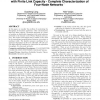144
click to vote
INFOCOM
2011
IEEE
14 years 5 months ago
2011
IEEE
—We consider the problem of maximizing the throughput of Byzantine agreement, when communication links have finite capacity. Byzantine agreement is a classical problem in distri...
164
click to vote
ICDCN
2011
Springer
14 years 5 months ago
2011
Springer
We address the problem of designing distributed algorithms for large scale networks that are robust to Byzantine faults. We consider a message passing, full information model: the ...
104
click to vote
CORR
2007
Springer
15 years 2 months ago
2007
Springer
We provide new and tight lower bounds on the ability of players to implement equilibria using cheap talk, that is, just allowing communication among the players. One of our main r...
126
Voted
CORR
2006
Springer
15 years 2 months ago
2006
Springer
In this paper, we present a Byzantine fault tolerant distributed commit protocol for transactions running over untrusted networks. The traditional two-phase commit protocol is enh...
136
click to vote
SODA
2008
ACM
15 years 3 months ago
2008
ACM
We resolve two long-standing open problems in distributed computation by describing polylogarithmic protocols for Byzantine agreement and leader election in the asynchronous full ...
118
click to vote
PODC
2010
ACM
15 years 4 months ago
2010
ACM
In this paper, we consider the problem of maximizing the throughput of Byzantine agreement, when communication links have finite capacity. Byzantine agreement is a classical probl...
125
click to vote
CRYPTO
2006
Springer
15 years 6 months ago
2006
Springer
In a seminal paper, Feldman and Micali (STOC '88) show an n-party Byzantine agreement protocol tolerating t < n/3 malicious parties that runs in expected constant rounds. H...
124
Voted
SPAA
2010
ACM
15 years 7 months ago
2010
ACM
In this work, we address Byzantine agreement in a message passing system with homonyms, i.e. a system with a number l of authenticated identities that is independent of the total ...
123
click to vote
PODC
2003
ACM
15 years 7 months ago
2003
ACM
This paper presents an efficient asynchronous protocol to compute RSA inverses with respect to a public RSA modulus N whose factorization is secret and shared among a group of pa...
148
click to vote
WDAG
2004
Springer
15 years 7 months ago
2004
Springer
In a Byzantine agreement protocol, a synchronous network of n interconnected processes of which t may be faulty, starts with an initial binary value associated with each process; a...

